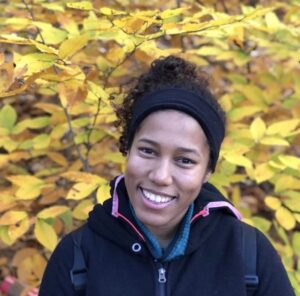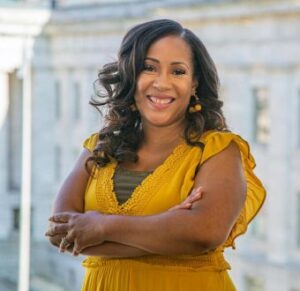After February’s Dire IPCC Report, The Green New Deal Is More Urgent Than Ever
No Comments yetThe ongoing war in Ukraine does not bode well for the future of peace and sustainability on planet Earth. As Noam Chomsky said in a recent interview for Truthout, “We are at a crucial point in human history. It cannot be denied. It cannot be ignored.” The latest report by the Intergovernmental Panel on Climate Change (IPCC), released on February 28, spells out the dire consequences of inaction to human-induced climate change. So, where do we stand in the fight against global warming? Is the Green New Deal project making inroads?
In the interview that follows, two leading climate activists — Margaret Kwateng, a national Green New Deal organizer at Grassroots Global Justice Alliance, and Ebony Twilley Martin, co-executive director of Greenpeace USA — discuss the significance of the Green New Deal project and its potential power as a transformative policy for saving the planet and creating a more fair and just social order.
C.J. Polychroniou: What would achieving the Green New Deal look like, and can it be accomplished in the next decade given the current political climate in the U.S.?
Margaret Kwateng: We are living in a moment where nearly all of our lives are being deeply impacted by the climate crisis — especially frontline communities around the world. From extreme droughts to floods, hurricanes, tornadoes and wildfires, whole communities are being devastated. The IPCC just released its latest global assessment of climate impacts that proclaimed the climate crisis is happening now, faster and more intensely than we expected. People are more aware than ever of the urgent need to stop the burning of the planet. The colliding crisis of climate change and the global pandemic has demonstrated that tragedies do not happen in a vacuum; rather, a crisis in one sector has ripple effects throughout our economy and touches on numerous parts of people’s lives. The real solutions to the climate crisis require a transformation of the extractive economy (away from fossil fuel and other resource extraction, labor exploitation and corporate profiteering) that has brought us to this breaking point.
We envision a decade of the Green New Deal because we know this scale of global crisis will require more profound change than we have seen in years. Our movements are stepping forward with a vision and a demand focused on the reorganizing of our economy to center life and well-being.
In this way, the Green New Deal is not one law or policy. The Green New Deal is a whole set of transformative policies that are able to address multiple crises at once. The THRIVE Act, which the Green New Deal Network (GNDN) worked with congressmembers to introduce in 2021, called for a $10 trillion investment to mobilize our economy and confront climate chaos, racial injustice and economic inequality. This is the floor of what is required to confront these crises, not the ceiling.
A realized Green New Deal would grow union jobs in renewables; build affordable housing and expand clean accessible public transportation; divest from brutal systems like prisons and the military; and invest in community infrastructure. The goal is not to simply regenerate the fabric of our society but to also create a national community that values the essential labor of care workers like domestic workers, home care workers and teachers; actualizes justice for communities that have long been left behind; and reduces the ripple effect when global, local or personal crises strike.
Our current conjuncture of overlapping crises — continued pandemic, climate chaos, chronic racial injustice, democracy under attack and escalating militarization — poses both turbulent terrain to pass bold visionary policies and also the ripe opportunity for intersectional solutions that address these crises together. We need to divest from the billions of dollars going to war and violent policing of our communities, and redirect investment to renewable energy, clean transportation, affordable housing and the care sector.
Our work is not to accept the intransigence of our governments and obstructionist politicians, but to shift the political landscape entirely by demanding the full scale of what we need to survive and to offer an irresistible vision of a future in which we all thrive. That is the power and potential of our movements mobilized together behind a truly transformative Green New Deal.
What was the impetus for diverse sectors of the climate justice movement, including labor, care workers, racial justice groups and Indigenous groups to come together to form the Green New Deal Network, and what role is the GNDN playing in achieving a Green New Deal?
Kwateng: While the demand for a Green New Deal and Rep. Alexandria Ocasio-Cortez’s Green New Deal resolution have dramatically shifted the national debate on climate change policy since 2018, the vision at the heart of a Green New Deal has been around for much longer.
Many communities have been working to make Green New Deal-like shifts a reality for decades, under other banners like climate justice and a just transition. For example, when miners realized coal jobs were leaving Kentucky and community members were fed up with the contaminated water resulting from those same mines, they decided to launch Appalachia’s Bright Future, creating plans for how to move away from disease-causing, environment-degrading fossil fuel extraction to an alternative future together.
Despite this level of on-the-ground expertise, many communities on the front lines of the climate crisis have been left out of larger conversations on how to address it. The vision for the Green New Deal Network is to be an intersectional coalition that brings together workers, community groups, activists, and Black and Indigenous organizations, particularly those on the front lines of crises, in the fight for visionary climate, care, jobs and justice policies.
The work of organizations like the Indigenous Environmental Network (IEN) has pushed the scope of the Green New Deal vision beyond just switching out gas cars for electric ones and, instead, toward centering racial justice and social, economic and ecological transformation. Just last October, IEN and allies descended on the capital to say that real climate justice means both respecting Indigenous sovereignty and stopping fossil fuel extraction.
In addition, groups like the Grassroots Global Justice Alliance and Service Employees International Union are at the table to advocate for a robust and dignified care economy as a critical component of a Green New Deal. Care workers are on the front lines of the climate crisis, and they are the backbone of a sector that will need to expand as climate crises intensify.
Because there are groups ranging from the Movement for Black Lives, to the Center for Popular Democracy, to the Working Families Party at the Green New Deal Network, we are building a united front capable of creating a Green New Deal that doesn’t replicate historically exclusive policies — in leaving out communities like women and Black folks — and instead is able to tackle the multiple crises we are facing. We are generating shared policy, electing progressives and holding them accountable, and organizing to change the social and political landscape to make the kind of change where communities across the country can thrive.
What are the barriers to bring about a Green New Deal this decade, and how do we break them down?
Ebony Twilley Martin: The Green New Deal is built on the vision of a world in which all people have what they need to thrive and the boundaries of the planet are respected. One of the biggest barriers to realizing this future is the profit-driven economic system in which massive corporations and a few wealthy elites control and exploit land, communities and legislation. This system prioritizes profits over the well-being of families while also driving the continued extraction from and commodification of the Earth. As you can see in the latest IPCC report, this is drastically upsetting the balance of life on the planet.
Unity is key in breaking down this barrier. But unity is not always easy. As we look to recover from COVID-19, address the climate crisis, advance racial justice and build an economy that puts people first, corporate overlords and those who do their bidding in Congress continually try to pit these priorities against each other in an attempt to divide us. We saw this play out last year when corporations lobbied against the Build Back Better Act attempting to put climate action, health care, workers’ rights and child care on the chopping block, despite all being overwhelmingly popular with the majority of Americans. The Green New Deal Network provides a space where organizations and communities can work together across priorities to establish a unified front. We know these crises are interconnected, and to solve one, we must address them all.
Disinformation is also a huge barrier that needs to be addressed. For years, corporations have offered us a false choice between a healthy economy or a healthy planet and communities. Oil and gas companies, in particular, like to hide behind the prospect of jobs and stability to justify their destructive “business as usual.” The truth is, we have a better chance at creating millions of good-paying, stable, union jobs with renewable energy than we do with fossil fuels. Just before the pandemic struck, clean energy jobs outnumbered fossil fuel jobs nearly three to one, totaling about 3.3 million jobs and growing 70 percent faster than the economy overall. And the clean energy industry proved resilient through 2020, too: Despite the pandemic and resulting economic crisis, 2020 was a record year for solar and wind installations, as the industry continued to attract investor interest.
Another piece of disinformation is that the current system is somehow safer. The Departments of Homeland Security and Defense, as well as the National Security Council and director of national intelligence, have all issued reports stating that climate change poses a threat to national security. Financial regulators are also calling it an emerging threat to the stability of the U.S. financial system. Most alarmingly, climate change threatens the health and safety of our families. Air pollution from fossil fuels killed 8.7 million people globally in 2018 alone. Pollution from fracked-gas infrastructure has increased the risk of cancer for 1 million Black Americans. It has also contributed to 138,000 asthma attacks and 101,000 lost school days for Black children like my sons.
Making this the decade of the Green New Deal will address these threats to our health and safety by transitioning off of fossil fuels and toward renewable energy. The House Committee on Oversight and Reform recently held hearings on the fossil fuel industry’s role in spreading disinformation, and at Greenpeace USA, we filed a complaint with the Federal Trade Commission against Chevron for greenwashing. People are starting to wise up to these tactics, but both government and private companies need to take measures to stop the spread of disinformation, and those who spread it need to be held accountable.
Why should people care about the work of the Green New Deal Network? How will this work benefit everyday people?
Martin: This question cuts to one area where we can certainly improve, and that’s how we communicate the goals and ambitions of a Green New Deal to our communities, families and friends. I know when a lot of my friends and family hear “Green New Deal,” they recognize the term, but don’t know what it includes or what it would do for them personally. Most of what is contained in the Green New Deal is extremely popular and would improve the livelihoods of everyday people. Things like clean energy and job investments, affordable housing, paid family and medical leave, and reducing child poverty — all regularly see support of around 60 percent and above in polls. It is our job as the Green New Deal Network to better help people to understand that the Green New Deal is the pathway to securing a better future.
At its core, the Green New Deal is about caring and uplifting one another. As we talked about earlier, we can overcome these challenges through unity. The Green New Deal Network is envisioned as a coalition that embodies this unity. Since the Green New Deal Network has both national and state-based priorities, our work covers everything from large federal legislation in Washington, D.C., to local fights in our communities. Whether your passion is preventing pollution, improving workers’ rights, building a fairer economy or improving the health care system, there is a space for people to get involved with the state coalitions and the organizations that are part of the Green New Deal Network.
If all of us in the Green New Deal Network can succeed in enacting the vision of a Green New Deal into federal, state, tribal and local governments across the country, then people throughout the U.S. will feel some relief from the oppressive, exploitative and downright violent forces that exist in everyday life. For some folks, these forces are outside their direct lived experience and exist only on the edges. For others, these are examples happening every day.
The Green New Deal will not solve all our problems — but it will show us that solutions are possible and that a transformation toward a more just, fair, green and equitable society is within our power to make a reality.
This interview has been lightly edited for clarity.
Copyright © Truthout. May not be reprinted without permission.
C.J. Polychroniou is a political scientist/political economist, author, and journalist who has taught and worked in numerous universities and research centers in Europe and the United States. Currently, his main research interests are in U.S. politics and the political economy of the United States, European economic integration, globalization, climate change and environmental economics, and the deconstruction of neoliberalism’s politico-economic project. He is a regular contributor to Truthout as well as a member of Truthout’s Public Intellectual Project. He has published scores of books and over 1,000 articles which have appeared in a variety of journals, magazines, newspapers and popular news websites. Many of his publications have been translated into a multitude of different languages, including Arabic, Chinese, Croatian, Dutch, French, German, Greek, Italian, Japanese, Portuguese, Russian, Spanish and Turkish. His latest books are Optimism Over Despair: Noam Chomsky On Capitalism, Empire, and Social Change (2017); Climate Crisis and the Global Green New Deal: The Political Economy of Saving the Planet (with Noam Chomsky and Robert Pollin as primary authors, 2020); The Precipice: Neoliberalism, the Pandemic, and the Urgent Need for Radical Change (an anthology of interviews with Noam Chomsky, 2021); and Economics and the Left: Interviews with Progressive Economists (2021).
You May Also Like
Comments
Leave a Reply









